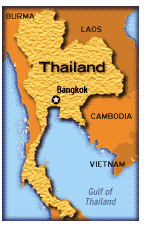|
Thailand

The Kingdom of Thailand,
popularly known as the land of smiles is located
in Southeast Asia on the Gulf of Thailand and
the Andaman Sea between the
 latitudes
6-12 N and longitudes 98-108 E. It shares
boundaries with Myanmar on the west and
northwest, Laos on the east and northeast,
Cambodia on the southeast, and Malaysia on the
south. It covers a total area of 513,115 sq. km.
Thailand is divided into four regions, north -
the mountainous region, northeastern - the arid
region, central - the fertile plains of the Chao
Phraya river and south rainforests. Thailand
enjoys a maritime climate, with the hot seasons
between March and June, the monsoons between
July and September and the cooler months between
December and February. latitudes
6-12 N and longitudes 98-108 E. It shares
boundaries with Myanmar on the west and
northwest, Laos on the east and northeast,
Cambodia on the southeast, and Malaysia on the
south. It covers a total area of 513,115 sq. km.
Thailand is divided into four regions, north -
the mountainous region, northeastern - the arid
region, central - the fertile plains of the Chao
Phraya river and south rainforests. Thailand
enjoys a maritime climate, with the hot seasons
between March and June, the monsoons between
July and September and the cooler months between
December and February.
Vulnerability to Disasters:
Thailand is vulnerable to
floods, tropical cyclones, droughts, and
earthquakes. floods, landslides, earthquakes and
forest fires.
Floods:
The most frequent of all
the hazards affecting Thailand is Floods. Floods
strike mainly in the monsoons between June and
September. The Chao Phraya river is very prone
to swelling and overflowing during the rainy
seasons bringing along with is great
destruction.
Droughts:
The main cause for
drought is the environmental degradation such as
deforestation. This has been aggravated in the
past years by the El Nino and ENSO oceanic
anomaly.
Tropical Storms:
The southern peninsula is
the most vulnerable to tropical storms. Typhoon
Gay a small diameter typhoon which crossed the
peninsular coast at pathiu just north of
Chumphon on 4 November, 1989 is recorded as the
most devastating typhoon to date.
Earthquakes:
The majority of tremors
have been felt in the northern regions of
Chiangmai, Chiang Rai and Kanchanaburi.
Man-made disasters or
technological hazards have increased in Thailand
with the rapid development and urbanization of
the country. The major technological hazards are
industrial fires, chemical hazards and
accidents.
Links:
|

